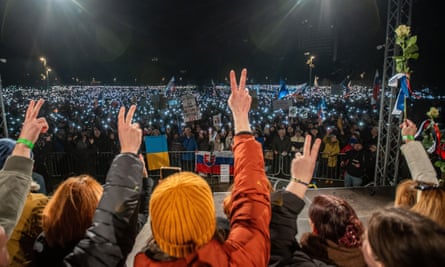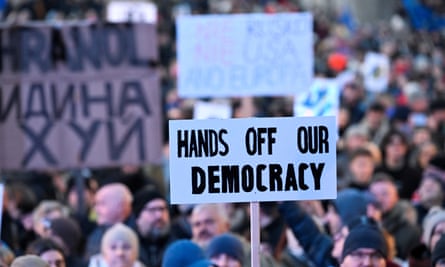Europeans who witnessed democracy crumble before their eyes have some words of advice for Americans now entering the second Trump era and worrying about the durability of their rights and freedoms: stay united, safeguard your civic institutions and never, never give up.
Citizens of central and eastern Europe are long accustomed to receiving counsel from a multitude of well-meaning US organisations on how to protect their fragile democracies following the fall of the Berlin Wall. Now, after just 10 days of Donald Trump’s executive orders and civil service purges, the advice is beginning to flow the other way.
When Serbians toppled the dictator Slobodan Milošević in a revolution in 2000, they had left autocracy behind, but the country’s fragile democracy has shrunk steadily over the past few years under the current president, Aleksandar Vučić. Their lesson is to take nothing for granted.
“I never liked the metaphor of the frog in a slowly boiling water, but it applies very well to our situation,” Srđan Cvijić at the Belgrade Centre for Security Policy said. “One decision at a time, our regime has stripped Serbia of its democratic system. It didn’t come overnight. First they captured the media, then the judiciary, then other independent institutions, then they started rigging the elections, and finally they are trying to strip us of the right to freedom of assembly.
“So my advice to Americans is never relax, always be on guard, democracy is not given, not even in the land of the free,” Cvijić said. “Things can go backwards, you have to fight daily for your rights, otherwise someone will take them away from you.
“The most important thing to defend is solidarity and human decency,” Cvijić added. “Do not allow the enemies of democracy to lower your own standards of political behaviour.”

Márta Pardavi, the co-chair of the Hungarian Helsinki Committee, has a similar message. She too has long experience of peaceful resistance to democratic backsliding. Since first being elected as prime minister in 2010, Viktor Orbán and his Fidesz party have aggressively hollowed out the independence of Hungary’s judiciary, media, and waged lawfare against civil society.
Pardavi said it was important to dodge the trap of mirroring the political tactics of those in power.
“Avoid siege mentality that, even inadvertently, fuels polarisation. Polarisation undermines trust in public institutions such as the media and the courts,” she said.
“The lower the level of public trust in these institutions, the easier it becomes to capture them. Strive to strengthen institutions by strengthening public trust in them. In turn, ensure these democratic institutions are deserving of this public trust by performing their duties fairly and effectively. Hold them to account.”
While most of the lessons from Europe come from formerly communist countries in central and eastern Europe, Italian democrats also have relevant experience. Eighty years after the second world war, a party with fascist roots came to power in elections in 2022. Its prime minister, Giorgia Meloni, a Trump favourite, is in the process of consolidating power through constitutional reform.
Nathalie Tocci, the director of the Istituto Affari Internazionali, said Italy’s liberal democrats were “not doing fantastically well” so far at defending democratic norms, but had some basic lessons to pass on to Americans.
“The short answer is institutions, institutions, institutions (and the separation of powers between them),” Tocci said. “So far it’s what has contained the damage in Italy.”
Igor Bandović, the director of the Belgrade Centre for Security Policy, said Trump’s early move to sack 18 government watchdogs, suggested he is fast-tracking the illiberal playbook all too familiar in Serbia.
“It’s a pattern I’ve seen before – one that starts with the quiet dismantling of oversight and ends with institutions that serve only those in power,” Bandović said. “The US still has strong institutions and vocal opposition, but watching these watchdogs be dismissed makes me wonder: is this how it starts?”
Slovakia has seen just how quickly democratic norms can corrode. The current prime minister, Robert Fico, came to power in 2023. His party, Smer, won just 23% of the vote but he was able to put together a coalition with which he has reshaped the country in less than two years.

He has shut down the special prosecutor’s office which had been established to fight corruption, steadily extended political control over state and privately owned media, purged cultural institutions and put loyalists in charge, while courting Vladimir Putin as a political ally.
“We can see now in Slovakia how important the institutions are – and not only institutions like courts or police but also cultural institutions on the periphery,” Monika Kompaníková, an author and editor, said. She argued the defence of democratic norms consisted of many small battles, fought daily.
“People have to be aware that every single step over the line that we tolerate pushes that line,” Kompaníková said, reminding Americans that language matters, as one of the fronts on which democracy is won or lost.
“For example, if we tolerate members of the government who are verbally abusive towards women, abusive language will be standardised and later even the law could be changed for the benefits of the abusers.”
Poland went through eight years of democratic backsliding under the rightwing populist Law and Justice party, which diluted the judiciary and turned the state broadcasting network into a party propaganda mouthpiece. But despite the party’s monopoly of state media messaging, it was eventually ousted in 2023 when there was record turnout at parliamentary elections, especially among young Poles. Poland is an example of how the anti-democratic tide can be turned.
Paulina Milewska at the Helsinki Foundation for Human Rights in Poland, argues one of the reasons democracy was able to fight back was the resilience of privately owned media, about 70% of which remained independent throughout the period of illiberalism.
“What was helpful for some media was they started their own foundations so they didn’t have to either shut down or sell themselves. They started getting big donations from wealthy individuals,” Milewska said.
She added that some media startups which began in reaction to the Law and Justice party taking power, funded themselves almost wholly from reader subscriptions, and by being fresh on the media scene, managed to sidestep the general lack of trust in more established titles, especially among younger readers.

Furthermore, independent Polish organisations raised money for legal defence funds to counter lawfare tactics by the ruling party and its supporters, who sought to drown critical media in lawsuits. Milewska said the survival of independent news outlets helped create conditions for the record turnout in the 2023 election which ended Poland’s illiberal era, a possible lesson for the US.
“There were some 30 different campaigns before the election that said: voting is cool, voting is sexy, voting is something you want to do,” Milewska said. “The fact that there were still independent media where you could launch this campaign … was certainly gamechanging.”
The common message from Europe’s pro-democracy activists was to keep fighting.
Pavel Slunkin, a former diplomat from Belarus, said: “The worst thing that Americans could do now is to stay out of politics.”
Belarus only enjoyed a brief experiment in democracy before Alexander Lukashenko took presidential office in 1994 and shut the door behind him. This week, Lukashenko entered his seventh straight term in office, after an election widely denounced as a sham.
Slunkin, who resigned as a diplomat in 2020 to protest against the death of democracy in his country, said Americans should avoid the complacency of assuming they can sit out the next four years and then the electoral pendulum would swing back.
The lesson of Belarus he argued, was that democratic institutions can be subverted quickly once loyalty replaces merit as the main qualification for a civil service job, a trend that is already well under way in Washington.
“This is how it all starts, and in four years, the whole country may look very different,” Slunkin said. “Authoritarianism is not something that happens overnight. It is the process of crossing one red line after another over time, without meeting resistance.”
There is a stark contrast now, Slunkin said, with his first stint as a diplomat in the US, some two decades ago. Slunkin was struck then by Americans’ self-confidence.
“They didn’t need advice from anyone. They knew right from wrong, and how powerful they were,” he said. “Now when I share the stories of my people and my country, they listen to me.”


.png) 3 months ago
34
3 months ago
34

















































